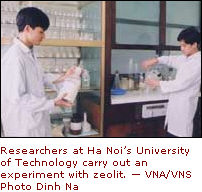



Researchers find economical way of producing water purifing material
VIETNAM - Revolutionary technology in the production of zeolit, a filtration material useful in areas including seafood breeding and environment protection, invented by a team led by Dr Ta Ngoc Don allows for nationwide use.
 The invention won first prize in the Viet Nam 2005 Science and Technology Invention Competition.
The invention won first prize in the Viet Nam 2005 Science and Technology Invention Competition.
What is zeolit?
Zeolit is a kind of spongy material that can absorb hard metals, ions and harmful organic substances. The material has a special structure that has been applied to many important fields including petroleum refineries, oil filtration, health care, and environmental protection.
But for many years, Viet Nam has imported zeolit at a high cost.
Realising the disadvantage, Don was determined to find a solution through discovering a way to produce zeolit from clay.
While he was writing his thesis for his master’s degree in chemistry, Don met with his professors, including scientists Hoang Trong Yem and Dao Van Tuong, to ask for advice.
He also consulted fifty other scientists.
In the end, he and two of his teachers decided to study how to turn clay into zeolit.
The road to success
"You can find clay anywhere in the whole country, which is a favourable condition for us," Don said.
To produce one gram of zeolit, he and his colleagues had to study tonnes of clay. They used organic substances to destroy the old structure of clay and crystallise it into zeolit’s structure.
After 10 years of research, the project succeeded. The provinces of Can Tho and Quang Binh were chosen as sites to apply the new technology.
Two initial factories were set up: Quang Binh’s Chemicals and Rubber company COSEVCO in 2004 and Can Tho’s Fertiliser and Chemicals Company in 2005. Both reached a capacity of 300,000 tonnes of zeolit annually.
Zeolit imported from Thailand and Indonesia, used for treating water in shrimp ponds, usually costs VND5 million per tonne. When zeolit is produced in Viet Nam, the price decreases to VND2 million.
But the high quality of zeolit produced in Quang Binh is what made it famous.
People in the southern province of Ben Tre used to import zeolit to treat dirty water in shrimp ponds, which was killing many shrimp. Hearing about the zeolit from Quang Binh, they tried it and realised how useful it was.
As estimated, a production line with 3,000 tonnes of zeolit per year can meet 0.5 per cent of domestic demand, which makes an annual profit of VND5 billion.
The success of the invention has contributed to using natural resources efficiently, in which cheap material is converted into a valuable product.
With its trademark, cheap price and high credibility, Bach Khoa zeolit has an opportunity to enter foreign markets.
More applications
Another application of zeolit is to be used as an assistant fertiliser to improve soil quality.
Normally, plants absorb a maximum 50-60 per cent of fertiliser, while the remainder is swept away or destroyed.
Fertiliser additives can be used to make fertiliser more productive.
Fertiliser additives also makes soil spongier and wetter. About 3,200 sq. m of rice farms in the districts of Tho Xuan, Dong Son and Thieu Hoa in the central province of Thanh Hoa applied the substance. The result helped to allow a 20-40 per cent reduction of fertiliser use, which saves about VND300,000 to 600,000 per hectare.
One businessman in Thanh Hoa has pledged to spend VND10 billion on building the first factory to produce the fertiliser NPK, which contains zeolit, in Viet Nam, with a capacity of 15,000 tonnes annually.
A substance containing zeolit mixed with animal food can improve animal digestion, economise the amount of food they consume, and increase their resistance to disease.
A Thuî Phuong pig study centre has agreed to experiment with zeolit in pig feed.
ThePoultrySite News Desk








